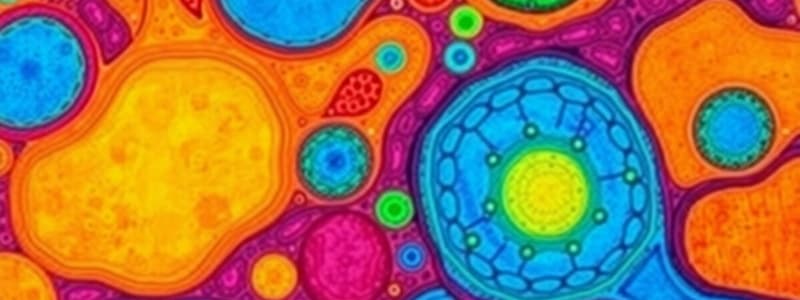Podcast
Questions and Answers
What distinguishes the structural organization of organs in complex animals from that in complex plants?
What distinguishes the structural organization of organs in complex animals from that in complex plants?
- Complex animals have simpler organs than complex plants.
- Complex animals and complex plants have similar structural organization.
- Complex plants have more specialized organs than complex animals.
- Complex animals have more specialized and localized organs than complex plants. (correct)
Why might meristematic tissue lack vacuoles?
Why might meristematic tissue lack vacuoles?
- Vacuoles are not essential for growth in meristematic tissue.
- Lack of vacuoles allows for quicker cell division. (correct)
- Vacuoles are unnecessary for the photosynthetic process.
- Meristematic cells require maximum space for nucleated growth.
How does the feeding method influence the organ system design in animals compared to plants?
How does the feeding method influence the organ system design in animals compared to plants?
- Animals have organ systems adapted for active locomotion, while plants are adapted for a sedentary lifestyle. (correct)
- Both groups of organisms have organs designed for the same feeding methods.
- Animals develop more complex stem structures due to their feeding methods.
- Plant organ systems are more tailored for active locomotion.
What characteristic is NOT associated with meristematic tissue?
What characteristic is NOT associated with meristematic tissue?
In what way do complex animals and plants differ in their adaptations?
In what way do complex animals and plants differ in their adaptations?
What is a primary characteristic of unicellular organisms?
What is a primary characteristic of unicellular organisms?
What defines a tissue in multicellular organisms?
What defines a tissue in multicellular organisms?
How do plant and animal tissues differ in terms of growth?
How do plant and animal tissues differ in terms of growth?
Which type of tissue primarily helps transport nutrients and water in plants?
Which type of tissue primarily helps transport nutrients and water in plants?
Why do animals consume more energy than plants?
Why do animals consume more energy than plants?
What is a key feature of supportive tissue in plants?
What is a key feature of supportive tissue in plants?
Which statement is true about animal tissues compared to plant tissues?
Which statement is true about animal tissues compared to plant tissues?
What is the classification of plant tissues based on their dividing capacity?
What is the classification of plant tissues based on their dividing capacity?
Flashcards
Meristematic tissue
Meristematic tissue
A type of tissue that is responsible for growth in plants. It's made up of actively dividing cells with dense cytoplasm, thin walls, and prominent nuclei.
Cuticle
Cuticle
A protective layer found on the outer surface of plant stems and leaves, preventing water loss. It is usually waxy and waterproof.
Collenchyma
Collenchyma
A type of plant tissue that provides support and strength, particularly in young stems and leaves. Its cells have thickened cell walls, giving it a strong structure.
Parenchyma
Parenchyma
Signup and view all the flashcards
Phloem
Phloem
Signup and view all the flashcards
Tissue
Tissue
Signup and view all the flashcards
Division of Labor
Division of Labor
Signup and view all the flashcards
Cell Specialization
Cell Specialization
Signup and view all the flashcards
Supportive Tissue (Plants)
Supportive Tissue (Plants)
Signup and view all the flashcards
Permanent Tissue
Permanent Tissue
Signup and view all the flashcards
Localized Growth (Plants)
Localized Growth (Plants)
Signup and view all the flashcards
Uniform Growth (Animals)
Uniform Growth (Animals)
Signup and view all the flashcards
Study Notes
Unicellular vs. Multicellular Organisms
- Unicellular organisms (e.g., Amoeba) have one cell performing all functions (movement, feeding, gas exchange, waste removal).
- Multicellular organisms (e.g., humans, plants) have specialized cells grouped into tissues for efficient function.
Cell Specialization and Tissues
- Specialized cells carry out specific tasks.
- Groups of similar cells working together form tissues (e.g., blood, phloem, muscle).
- Tissues are arranged for optimal function.
Plant vs. Animal Tissues
- Plants:
- Stationary, upright structure necessitates supportive tissues (often with dead cells).
- Growth is limited to specific regions (meristematic vs. permanent tissue).
- Animals:
- Mobile, have living tissues.
- Growth is generally more uniform without distinct dividing/non-dividing regions.
- Complex animals have more specialized and localized organ systems compared to plants. This difference is linked to their different lifestyles (feeding, movement).
Meristematic Tissue
- Active cells with dense cytoplasm, thin walls, prominent nuclei, and a lack of vacuoles.
Studying That Suits You
Use AI to generate personalized quizzes and flashcards to suit your learning preferences.




